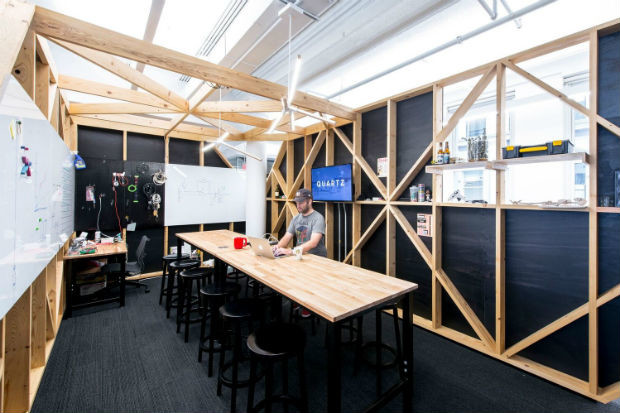Sam Williams has been part of the team at Quartz since before the site's official launch in 2012. As senior software engineer, he worked on many products, including annotations, Quartz’s version of comments on the website, an authentication system, and the Quartz app.
He has also been working on his own side projects in the newsroom, such as building a light bulb that would change colour based on the weather outside. It was these projects that would lead him to his next job title: director of the workshop, which came into existence in April.
Williams is still part of the product group, reporting directly to Zach Seward, senior vice president of product and executive editor.
“It's become more of a thing at the office that we've been trying to expand more on,” he told Journalism.co.uk.
“That’s what the workshop is, moving over to this new position of experimenting with more technologies and new platforms, seeing 'is there an opportunity for Quartz'… and building a real thing to connect to instead of reading over the press release.”
The experiments are both projects that end up being used inside the office, testing what is possible with the Internet of Things for example, as well as products that can be put in front of audiences.
Another aspect of his role as director of the workshop is to work together with staff, both on the editorial and commercial sides of the organisation, to help them come up with their own projects and build on “the things that they are obsessed with”, as well as teaching journalists how to code.
"This new role is intended to maintain that spirit of experimentation, which has come to define Quartz and helped make us successful. At our larger size, it's necessary to make official parts of the company that developed organically, like this one," Seward wrote in a memo to staff announcing the change.
The workshop also exists as a physical space in the New York office, with a 3D printer, hooks to hold tools on the walls, and a standing table.
“It's more of a communal workspace where we can all sit and talk or work, and that's mostly where I am at these days for people to come in and bounce ideas and throw stuff on the white boards and see what we can play with.“
The workshop is currently in the transition period, where Williams is bringing in projects he was previously working on, including a coffee pot switch that lets staff know when the coffee is ready by sending a Slack message.
In a previous office, Quartz also had a light bulb that would change colours to indicate whether the dishwasher had finished a load, using a heat sensor and a tilt sensor to asses when the dishes were washed and taken out.
And when Williams wanted to learn more about machine learning, he built a bot that played Atari games, and put the video onto screens in the office. This soon became a Facebook Live that proved to be one more of the more popular live videos Quartz has streamed to Facebook.
Williams’ experiments are an important part of the office culture at Quartz, and one of his passion projects is working on better ways to connect Quartz’s global offices.
While some newsrooms have screens displaying in-depth analytics and a myriad of numbers and figures that are updated in real time, Quartz's offices are more muted, and often display information designed to keep team members more connected to each other.
As well as top trending articles on Twitter, or the value of Bitcoin for example, these screens have displayed top scores for Dots when the game became an office obsession.
Williams is currently exploring the possibility of setting up a live video feed between offices, to serve as a window into the other offices.
“You can walk by and wave and say 'hi' to the other staff there just to connect us a little bit more, to always be aware that there's people there,” he said.
Free daily newsletter
If you like our news and feature articles, you can sign up to receive our free daily (Mon-Fri) email newsletter (mobile friendly).












